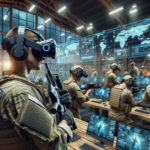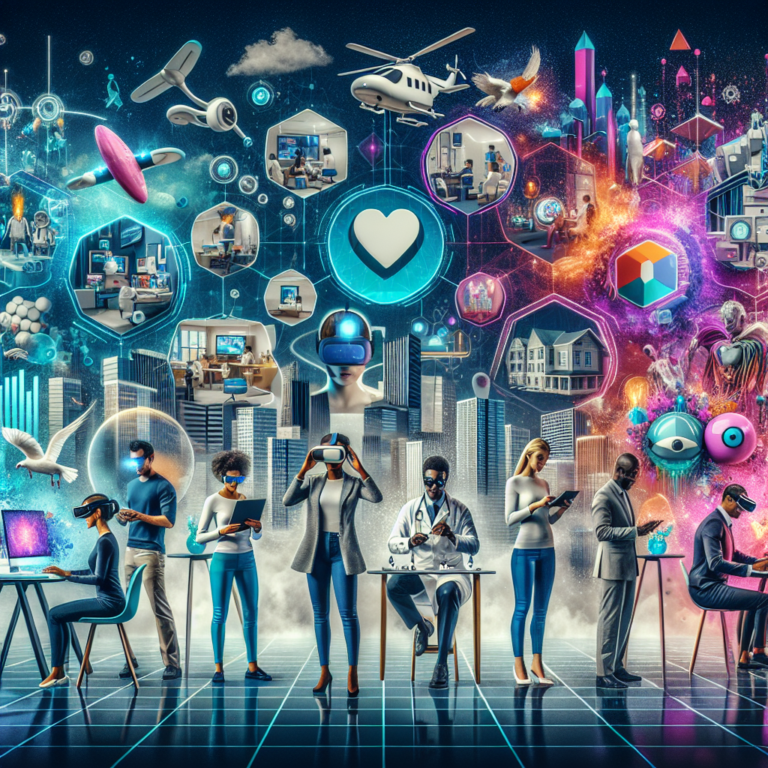Revolutionizing Industries: How Startups Harness Immersive Technologies for Disruption 🚀
The Rise of Immersive Technologies in the Startup Ecosystem
In recent years, immersive technologies—encompassing Virtual Reality (VR), Augmented Reality (AR), and Mixed Reality (MR)—have become key players in the startup space. These innovations are reshaping industries by creating engaging experiences and redefining how businesses interact with customers. Startups are now at the forefront of utilizing these technologies, driving disruption in ways that have yet to be seen.
Immersive Technologies: A Game Changer for Startups
Immersive technologies offer startups the chance to stand out in saturated markets. Here’s how they are capitalizing on these cutting-edge tools:
Enhanced Customer Engagement
One of the most significant advantages of immersive technologies is their ability to create unforgettable experiences. By employing VR and AR, startups can offer interactive product demonstrations and virtual trials that captivate consumers. Some notable applications include:
- Virtual Showrooms: Customers can explore products in a lifelike environment without leaving their homes.
- Interactive Apps: Brands like IKEA have leveraged AR to let customers visualize how furniture fits in their spaces.
- Training Simulations: Companies are utilizing VR to train staff in realistic scenarios, elevating efficiency and competence.
Cost-Effective Solutions
For startups operating on tight budgets, immersive technologies can provide cost-effective solutions compared to traditional methods. With impressive capabilities like remote collaboration and virtual training programs, organizations can save time and money. For instance:
- Reducing Overheads: By using VR for training, startups circumvent the need for physical space and materials.
- Global Reach: Virtual events run on a fraction of the budget needed for face-to-face conferences, connecting with users worldwide.
- Streamlined Processes: AR applications can assist manufacturing startups by offering real-time instructions, reducing errors and waste.
Industry-specific Applications of Immersive Technologies
Each industry has unique needs, and startups are tailor-making solutions using immersive technologies. Below are several sectors where these innovations are producing substantial disruption:
Healthcare
Startups in the healthcare sector have embraced immersive technologies to improve patient care and facilitate training for medical professionals. Notable initiatives include:
- Surgical Simulations: VR helps train surgeons by allowing them to practice operations in a risk-free environment.
- Patient Education: AR can provide patients with interactive visuals to better understand their conditions and treatment plans.
- Telemedicine Enhancements: Immersive environments can create personalized consultations, bridging the gap for remote patients.
Real Estate
In the competitive real estate market, startups are employing immersive technologies to streamline the buying process. Here’s how they are changing the landscape:
- Virtual Tours: Prospective buyers can visit multiple properties without leaving their homes, enhancing convenience and saving time.
- 360-Degree Visualizations: Luxurious listings gain an edge by showcasing stunning views and layouts through immersive experiences.
- Interactive Neighborhood Guides: New buyers can explore local amenities and attractions virtually, aiding decision-making.
Education and Training
Startups in the education sector are revolutionizing the way knowledge is imparted using immersive technologies. Consider these engaging educational experiences:
- Virtual Classrooms: Students can attend remote lectures in interactive environments, promoting collaboration and social interaction.
- Skill Development: VR simulations enable users to acquire hands-on experience in various fields, from mechanics to surgeries.
- Cultural Experiences: AR can facilitate immersive learning, taking students on virtual field trips across the globe.
The Role of AI in Enhancing Immersive Technologies
Artificial Intelligence (AI) is increasingly playing a role in the evolution of immersive technologies. Startups are leveraging AI to create smarter, more realistic experiences that engage users and adapt to their needs. Here are some notable facets:
Intelligent User Interactions
New startups are utilizing AI to offer personalized experiences by analyzing user behavior and preferences. This allows businesses to:
- Enhance Tailoring: Customizing experiences to align with individual user interests increases engagement and satisfaction.
- Predictive Analytics: AI’s ability to analyze vast datasets in real-time helps anticipate user needs, improving service delivery.
- Natural Language Processing: AI-driven chatbots can answer user queries within immersive environments, streamlining communication.
The Future of Startups and Immersive Technologies
As we look ahead, the continued advancements in immersive technologies promise to further disrupt various industries. Startups are uniquely positioned to harness these innovative tools and redefine not just how they operate but also how consumers interact with their products and services.
- Collaboration Across Industries: The synergy of VR, AR, and AI will foster even more collaborative efforts, leading to new business models.
- Emergence of New Markets: Startups may create new niches as immersive technologies continue to evolve, opening doors previously thought impossible.
- Focus on Sustainability: The digital nature of immersive experiences can reduce physical resources needed, supporting eco-friendly practices.
In an era of constant disruption, startups leveraging immersive technologies are paving the way for an exciting future. By continually innovating and adapting, they are not only transforming their businesses but setting new standards for entire industries. The possibilities are virtually limitless! 🌟




0 Comments